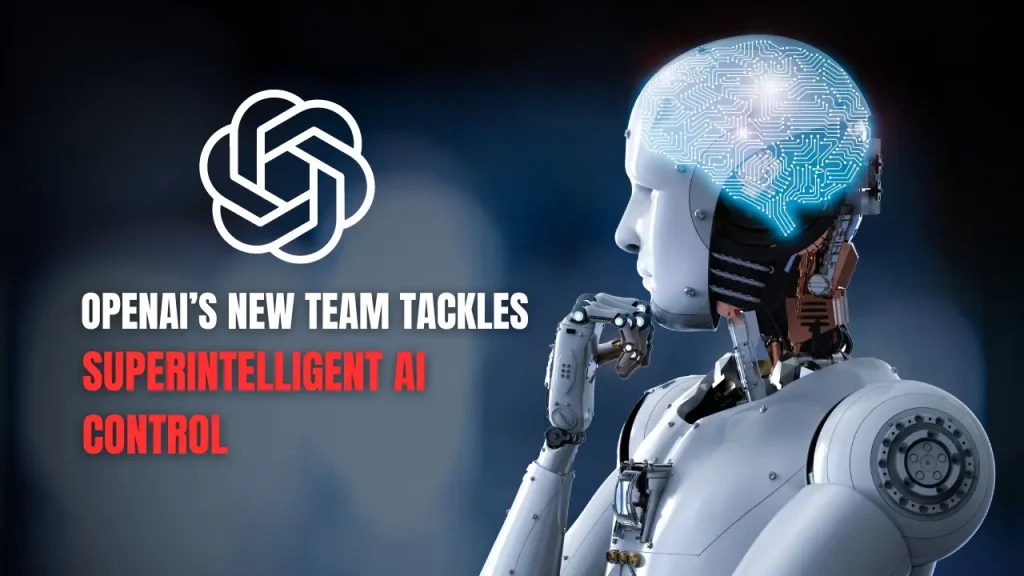Openai’s New Team Tackles Superintelligent AI Control

OpenAI, a leading artificial intelligence (AI) research organization, has recently established the Superalignment team, led by Ilya Sutskever, with the aim of addressing the critical challenges associated with steering and controlling superintelligent AI systems. This newly formed team intends to focus on the core technical obstacles in this field over the next four years.

OpenAI foresees the emergence of AI systems surpassing human intelligence within the next decade and recognizes the need to ensure the alignment of these systems with human values.
To achieve this, the team plans to develop a human-level automated alignment researcher that will utilize human feedback, thereby expediting alignment research advancement.
Concurrently, human researchers will be primarily engaged in reviewing the alignment research conducted by AI systems.
OpenAI also acknowledges the limitations and potential biases associated with AI-based evaluation and commits to sharing their findings widely and contributing to the alignment and safety of non-OpenAI models.
This article provides an insightful and balanced analysis of OpenAI’s new team and their approach to addressing the control of superintelligent AI systems.
Key Takeaways
- OpenAI has established a Superalignment team led by Ilya Sutskever to address challenges in controlling superintelligent AI systems.
- OpenAI plans to develop a human-level automated alignment researcher using human feedback.
- Human researchers will review alignment research conducted by AI systems.
- OpenAI commits to sharing findings and contributing to the alignment and safety of non-OpenAI models.
Research Approach
One approach being taken by the research team is to develop a human-level automated alignment researcher that utilizes human feedback to train and evaluate AI systems, with the aim of addressing the core technical challenges in controlling superintelligent AI.
This approach recognizes the importance of ethical considerations in harnessing the potential of AI while ensuring its alignment with human values. By leveraging human feedback, the team aims to create AI systems that are not only technically advanced but also ethically sound.
Additionally, this research approach acknowledges the need for continuous technical advancements in the field of AI. By developing a human-level automated alignment researcher, the team aims to make significant progress in understanding and controlling superintelligent AI, while also contributing to the broader alignment and safety of AI models beyond OpenAI.
Human-AI Collaboration
To foster effective collaboration between humans and artificial intelligence, the research team seeks to develop a symbiotic relationship that leverages the unique strengths and capabilities of both parties in order to address the challenges associated with controlling highly intelligent AI systems.
Ethical considerations and decision-making processes play a crucial role in this collaboration. OpenAI recognizes the limitations and potential biases of using AI for evaluation, and thus places human researchers in the role of reviewing the alignment research done by AI systems.
By combining the speed and efficiency of AI systems with the critical thinking and ethical judgment of human researchers, the team aims to achieve a comprehensive and robust approach to superintelligent AI control.
This human-AI collaboration approach acknowledges the need for human oversight and intervention while leveraging the computational power and learning capabilities of AI systems.
Sharing and Contribution
Sharing and contribution are key elements of OpenAI’s strategy to address the challenges associated with controlling highly intelligent AI systems. OpenAI aims to share the fruits of their research efforts broadly and contribute to the alignment and safety of non-OpenAI models.
This approach reflects a commitment to collaborative efforts and ensuring that the impact of their work extends beyond their organization. By openly sharing their findings and tools, OpenAI promotes transparency and allows other researchers and organizations to benefit from their discoveries.
This collaborative approach can accelerate progress in the field of AI alignment and increase the likelihood of developing effective methods for controlling superintelligent AI.
While there may be limitations and potential biases in using AI for evaluation, OpenAI’s focus on sharing and contribution demonstrates their dedication to addressing the challenges of superintelligent AI in a collective and inclusive manner.
| Collaborative efforts | Broad impact |
| Sharing research findings and tools | Accelerating progress in AI alignment |
| Facilitating transparency and knowledge exchange | Increasing the likelihood of effective control methods |
| Contributing to the safety of non-OpenAI models | Promoting a collective and inclusive approach |
Potential Limitations
The utilization of AI for evaluation raises concerns regarding potential limitations and biases. While OpenAI aims to build a human-level automated alignment researcher to train AI systems and evaluate other AI systems, there are ethical considerations and challenges that need to be addressed.
One potential limitation is the reliance on data that may contain inherent biases, leading to biased evaluations. Additionally, the AI systems themselves may have limitations in understanding complex ethical considerations, potentially resulting in biased assessments. It is crucial to develop rigorous methods for bias assessment and to continually refine and improve these methods.
OpenAI acknowledges these limitations and potential biases, highlighting the need for human oversight and review of alignment research conducted by AI systems to ensure a balanced and objective evaluation of superintelligent AI control.
